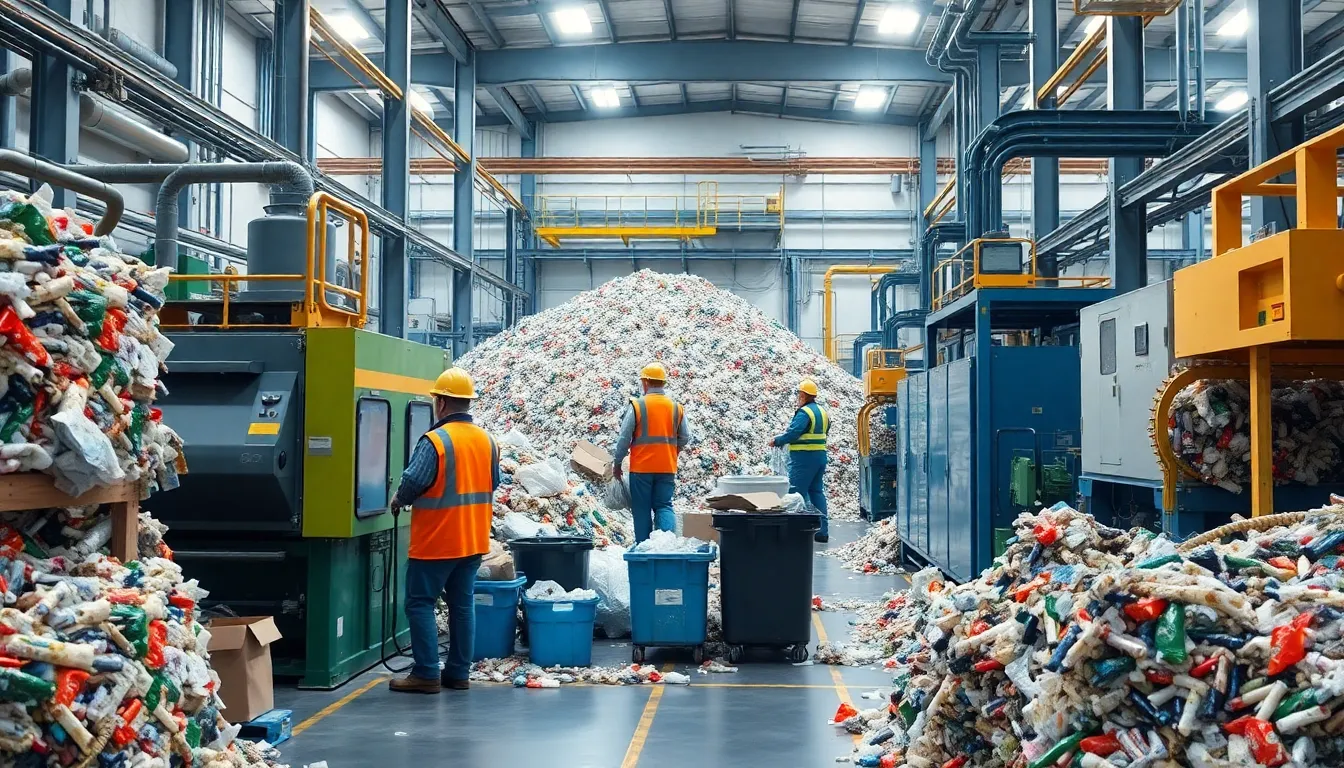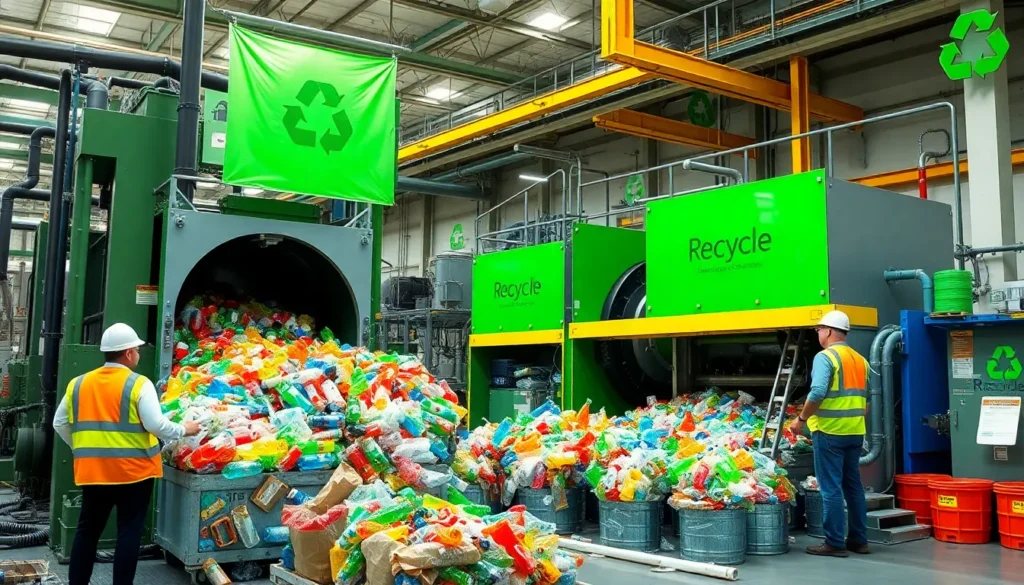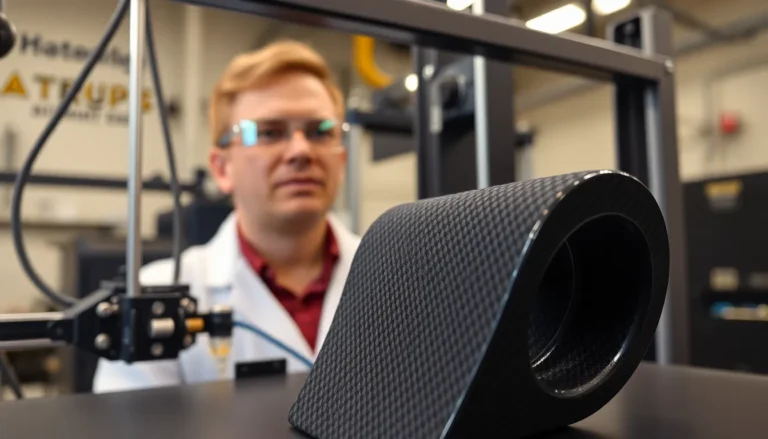Table of Contents
ToggleIn a world drowning in plastic and waste, advanced recycling tech is the lifeboat we didn’t know we needed. Imagine a future where yesterday’s trash becomes tomorrow’s treasure, all thanks to some clever gadgets and groundbreaking processes. Forget the days of tossing out your old water bottle; it’s time to turn that plastic into a brand-new pair of shoes—or maybe even a stylish handbag.
Overview of Advanced Recycling Tech
Advanced recycling technology represents an innovative approach to managing plastic waste. This technology involves converting discarded plastic items back into their original monomers or other useful materials. Various methods exist within this realm, including chemical recycling and molecular recycling.
Chemical recycling breaks down plastics into hydrocarbons, allowing for the creation of new, high-quality plastics. Molecular recycling employs advanced processes to deconstruct plastic molecules, ensuring a higher purity level in the end products.
Recent advancements have made these processes more efficient and cost-effective. Some facilities can process thousands of tons of plastic waste annually, significantly reducing the amount sent to landfills. The implementation of advanced recycling also promotes a circular economy by continuously reintroducing materials into the supply chain.
Technological investments have spurred the development of cutting-edge machines that automate and optimize these recycling processes. For example, innovations in pyrolysis and gasification techniques enhance overall yield and energy recovery.
Industry leaders increasingly recognize the value of partnerships in expanding advanced recycling capabilities. Collaborative efforts between municipalities, corporations, and tech developers drive progress and adoption. Furthermore, educational campaigns inform the public about the importance of recycling and the technologies that support it.
As regulations around plastic waste tighten, advanced recycling tech becomes integral in compliance efforts. Beyond meeting regulatory requirements, this technology aligns with sustainability goals, appealing to environmentally conscious consumers.
Overall, advanced recycling technology holds promise in not only managing plastic waste but also in creating a sustainable future through resource recovery and material reuse.
Key Technologies in Advanced Recycling

Advanced recycling employs various innovative technologies to tackle plastic waste effectively. These methods enhance recycling capabilities, ensuring materials can be reused multiple times.
Chemical Recycling
Chemical recycling breaks down plastics into their original monomers. This process transforms discarded plastics into feedstock for producing new high-quality plastics. Natural gas, oil, or other hydrocarbons serve as inputs, creating a cycle that minimizes waste. Facilities utilizing chemical recycling can handle large volumes, processing thousands of tons annually and boosting overall efficiency. By improving purity levels in output products, this method cultivates a sustainable path for managing plastic waste.
Biochemical Recycling
Biochemical recycling leverages biological processes to decompose plastics. This technology converts plastics into organic materials through enzymatic or microbial action. Significant advancements in enzymes increase their effectiveness in breaking down complex polymers into simpler compounds. These compounds can then be used as raw materials for creating new products. Facilities can also benefit from reduced energy requirements and lower carbon emissions, aligning with sustainability goals. As the method gains traction, it offers a promising pathway toward a circular economy in plastics.
Benefits of Advanced Recycling Tech
Advanced recycling technology offers significant benefits, specifically in the areas of environmental impact and economic advantages. These technologies play a critical role in addressing plastic waste and fostering a sustainable future.
Environmental Impact
Advanced recycling tech significantly reduces plastic waste, diverting millions of tons from landfills annually. This process minimizes pollution associated with traditional waste management methods, decreasing greenhouse gas emissions linked to decomposition. Recycling plastics back into their original monomers enhances material purity, enabling the production of high-quality new products. It also promotes resource recovery, ensuring valuable materials remain within the supply chain. Notably, advancements in energy recovery and resource utilization lead to more efficient processes, further mitigating environmental harm. Technological innovations create a closed-loop system where plastic waste is continuously repurposed, ultimately fostering a circular economy that lessens reliance on virgin materials.
Economic Advantages
Advanced recycling technology drives economic growth through job creation and reducing costs associated with waste disposal. Facilities processing advanced recycling can manage thousands of tons of plastic waste each year, leading to increased operational efficiency. Investment in these technologies attracts funding from corporations and municipalities focused on sustainable practices. Moreover, companies that adopt advanced recycling methods can lower their material costs by reusing high-quality recycled feedstock instead of sourcing new materials. This cost-effectiveness positions businesses competitively in a market increasingly oriented toward sustainability. Overall, the economic benefits of advanced recycling tech present compelling reasons for industries to embrace these innovations.
Challenges and Limitations
Advanced recycling technology faces several challenges that might hinder its widespread adoption. These obstacles include technological barriers and regulatory issues that impact the efficiency and scalability of recycling processes.
Technological Barriers
Advancements in technology come with inherent limitations. Complexities in the design of recycling systems can result in high operational costs. Some processes require significant energy resources, affecting overall sustainability. Additionally, specific materials, such as multi-layered plastics, prove difficult to recycle using current methods. Inefficiencies in sorting and contamination during collection further exacerbate the challenges faced by facilities. As such, improvements in technology must address these limitations to enhance effectiveness.
Regulatory Issues
Regulatory frameworks often lag behind technological progress. Existing laws may not adequately support advanced recycling practices, leading to inconsistent guidelines across regions. Businesses encounter hurdles when navigating approval processes, which can slow down implementation. Some regulations discourage certain types of plastics from being recycled, minimizing potential feedstock supply. Heightened scrutiny on environmental impacts also prompts regulators to impose stricter compliance measures. Addressing these regulatory challenges is essential for advancing the adoption of recycling technologies.
Future Trends in Advanced Recycling
Emerging trends in advanced recycling technology reveal a promising path for waste management and sustainability. Companies increasingly focus on developing innovative processes like upcycling, which repurposes low-quality plastics into high-value products. As more facilities adopt such practices, they significantly contribute to reducing plastic pollution.
Artificial intelligence enhances sorting and processing efficiency. Advanced AI algorithms distinguish types of plastics and identify contaminants, thus improving the purity of recycled materials. This technological advancement addresses one of the major challenges in the recycling industry, making operations more streamlined.
Collaboration among various stakeholders continues to strengthen. Partnerships between manufacturers, technology providers, and municipalities play a vital role in enhancing infrastructure for advanced recycling. Shared knowledge and resources allow for the expansion of recycling capabilities, ultimately fostering a more circular economy.
Investment in new technologies drives further progress. Investors increasingly recognize the potential for profit in advanced recycling ventures. These investments lead to the development of next-generation facilities that can process a wider range of materials, lowering costs and increasing operational efficiency.
Policy developments also shape the future landscape. Regulatory frameworks are beginning to catch up with technological advancements, helping to create a supportive environment for the growth of advanced recycling. These changes encourage industries to adopt sustainable practices, aligning with global environmental goals.
Public awareness campaigns are crucial for driving acceptance. Organizations actively engage communities in understanding the benefits of advanced recycling. Teaching consumers about the process and its positive impact increases participation and support for recycling initiatives.
Advanced recycling faces ongoing challenges, yet innovations continue to emerge. Solutions to improve processing and sorting technologies show promise in overcoming traditional limitations. With a commitment to sustainable practices, the pathway toward a more efficient and effective advanced recycling system becomes clearer.
Advanced recycling technology stands at the forefront of addressing plastic waste challenges. By transforming discarded materials into valuable resources, it fosters a sustainable circular economy. The recent innovations in chemical and biochemical recycling enhance efficiency and purity while reducing environmental impact.
As stakeholders collaborate and invest in these technologies, the potential for widespread adoption grows. Public awareness campaigns will play a crucial role in engaging communities and promoting responsible recycling practices.
While challenges remain, the ongoing advancements signal a promising future for advanced recycling, paving the way for a cleaner planet and a more sustainable economy.




